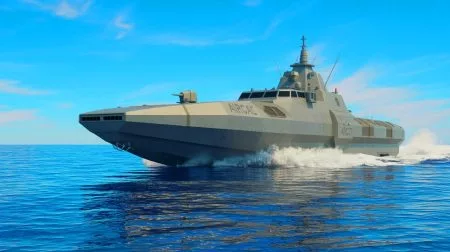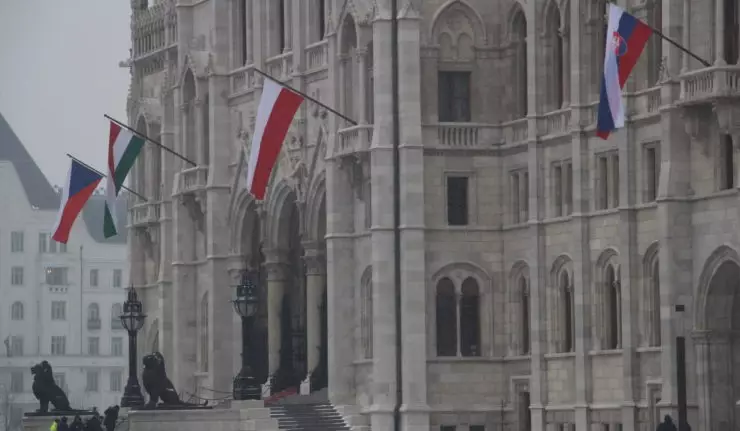Hungary, Budapest – Meeting at the Hungarian Parliament in Budapest, the highest parliamentary representatives of the Visegrád Group, whose Presidency is held by Hungary until the end of June, have reiterated their desire for a Europe of Nations, without external immigration, and for a stronger cooperation between their countries on many levels.
On Friday, March 2, László Kövér, Speaker of the Hungarian National Assembly, received his Czech, Slovak and Polish counterparts. In addition to the meeting of the presidents of assemblies and senates, several commissions of V4 parliamentarians have been formed to address different themes of cooperation in order to strengthen and develop them.
The V4 Commission for European Affairs reiterated the will of the V4 and its majority of parliamentarians to live in a European Union of Nations, where national parliaments would see their role strengthened. The issue of subsidiarity has also been discussed, and the V4 Commission has expressed serious concerns about the application of the latter by the European Commission.
For V4 parliamentarians, Brexit is a first of all question addressed to Europe: “where are you going?”. But it also represents an important upheaval from the Central European perspective. The V4 intends to get ready for it, and calls for the European Union to respect the exit of the United Kingdom without seeking to punish it, and for the Union to maintain excellent relations with the United Kingdom.
With Brexit, 85% of the EU’s GDP will come from the euro area, which will accentuate the “two-speed Europe”.
For the V4 Foreign Affairs Commission, the answer to Brexit is partly in the enlargement of the Union to the Western Balkans, but also to Moldova. Considering that Central Europe is the driving force behind this enlargement, notably via the Three Seas Initiative, Commission President Zsolt Németh explained that the main driver of this dynamic is Poland, because “size matters”. The enlargement of the EU to the Western Balkans is important especially to fill the void in which the United States and Russia are rushing in. Zsolt Németh also called on the EU not to make the same mistake as for Yugoslavia: one musts respect the Nations.
In addition, the Commission considers that the Permanent Structured Cooperation (PeSCo) of the European Union has been a great success of last year.
For the V4 Social Commission, the main theme has been the question of demography. Indeed, V4 countries all have fertility rates below 2, which means that their respective populations are numerically speaking in decline. To respond to this situation seen as problematic, the V4 recalled that it opposes the solution of immigration. “Our answers must serve our nations. We need family policies, not immigration policies, “said the Commission’s President.
Hungary, which had a fertility rate of 1.26 children per woman in 2010, is currently at 1.5 and targets 2.1 by 2030. The three pillars of Hungarian family policy were also given as an example: having children and impoverishment must not be synonymous, the state must support families materially and morally, and the image of kinship must be restored. The V4 accuses Brussels of choosing immigration over birthrate. In addition to that, the V4 also opposes the ideology of gender, and expressed its deep respect for children and the institution of marriage.
The V4 Economic Commission‘s position has addressed the question of cohesion fund in the EU’s 2020-2027 budget: for the V4, it is important not to reduce the cohesion fund following the departure of the United Kingdom, but instead increase the contributions to compensate the departure of the UK, in order to maintain the funds of cohesion that are a great success, and have proved their effectiveness.
The V4 Agriculture Commission has been in favor of maintaining the CAP and direct payments to farmers. However, the V4 wants less bureaucracy in the CAP and stresses that the issue of immigration should not be included into the CAP. The Commission also recalled the V4’s desire to fight against a two-speed Europe also in the field of the quality of manufactured products.
As for the V4 Defense Commission, it believes that the biggest security challenge for the European Union today is stopping mass immigration coming to Europe. And in this, stressed Szilárd Németh, the president of the Commission, the V4 showed that it was possible, while giving the example of a beautiful European solidarity: the V4 countries helped Hungary to stop the immigration at its border. In 2016, he recalled, there were still 124 agents from other V4 countries to secure the border. By 2017, this was no longer necessary.
The Hungarian Foreign Minister, coming out of a meeting with British Foreign Secretary Boris Johnson, also briefly spoke at the summit: the V4 has been buried several times, and yet it is stronger than ever; it demonstrates its longevity.
The minister recalled that Germany’s foreign trade with the V4 is 54% higher than with France and three time more than that with Italy. The V4 represents a market of 66 million inhabitants, and all must take it into account, especially given its dynamic growth, added Minister Péter Szijjártó.
According to him, the V4 has been several times right in the past. With Brexit, there will be fewer supporters of a Europe of Nations and this is one of the reasons for expanding the EU to the Western Balkans. For the head of the Hungarian diplomacy, the role of the V4 is critical regarding this enlargement, because the West of the Union misunderstands the interest of such an enlargement and sees it as a weight, while it is according to the Hungarian minister one of the best response to the challenges that the EU is facing.
One of the objectives of the V4 is also to improve north-south infrastructures. Mr Szijjártó gave the example of the Budapest-Warsaw route which requires 12 hours of travel, and added that the lack of motorway or connection of pipelines and electricity networks is also a problem. The Hungarian Minister said that one of the first steps to address this issue was the establishment of a high-speed line between Warsaw, Brno, Bratislava and Budapest.
Finally, the Hungarian Foreign Minister stressed the importance of Christianity and Christian traditions for Europe, as well as the role of the V4 in defending this legacy.
At the end of the summit, the Marshal of the Diet (President of the Polish National Assembly) Marek Kuchciński and the Marshal of the Polish Senate Stanisław Karczewski received from the President of the Hungarian Republic János Áder the Grand Cross of the Order of Merit of Hungary, in a ceremony attended by Hungarian Prime Minister Viktor Orbán.
——
Full text of the joint statement:
On the official meeting of Speakers/ Presidents of the Visegrád Group Parliaments
(Budapest, 2nd March 2018)
Having regard to our shared historic heritage and to the significance of a strong, responsible and cooperative Central-European region, meeting in Budapest on 2nd March 2018, we the Speakers of the Visegrád Group Parliaments have discussed our parliamentary cooperation as well as the opportunities offered by a joint presentation of issues of common interest at the different fora of the European Union.
We have reviewed the conclusions adopted unanimously by the meetings of our standing committees convening in the framework of the parliamentary program of the Hungarian Visegrád Group Presidency:
⦁ the Committees on European Affairs on the future of the European Union, the necessity to reinforce the role of national parliaments and the preparations for the expected consequences of Brexit;
⦁ the Committees on Foreign Affairs on the future of the Common Foreign and Security Policy, the EU and NATO integration of the Western Balkans region;
⦁ the Economic Committees on the revision of the Posting of Workers Directive and the next Multiannual Financial Framework;
⦁ the parliamentary committees dedicated to family policy issues on the significance of family policy in overcoming demographic challenges;
⦁ the Agriculture Committees on the reform of the Common Agricultural Policy, as well as on the need to abolish the practice of double standards in quality and unfair market practices in the food industry;
⦁ the Defence Committees on challenges related to migration and the defence cooperation of the Visegrád countries as an important pillar of regional stability and security.
We note that the objectives defined for the parliamentary programs of the Visegrád Group Hungarian Presidency have been met and the parliamentary dimension of the Visegrád Group cooperation gained strength, the Members of Parliament attending these meetings have come to important conclusions influencing the future of our countries and that of the European Union.
We welcome that the Speakers of the Visegrád countries’ parliamentary chambers have agreed to avail themselves of all opportunities available within the scope of the present European Union Treaties to strengthen the role of national parliaments, with special regard to subsidiarity checks and inter-parliamentary cooperation within the EU.
As a result of this joint stance the Speakers of the Visegrád countries’ Parliaments have consented to the letter of the Speaker of the Hungarian National Assembly László Kövér, addressed to the President of the European Commission Jean-Claude Juncker urging for a reinforced participation of national parliaments in the working group on subsidiarity.
We underline the right of Visegrád countries and of national parliaments to contribute constructively to the debate on the future of the European Union, having regard to the Joint Statement of the Visegrád Group Heads of Government on the future of Europe in March 2017 and January 2018, the conclusions of the European Council on the future of Europe, the Bratislava Declaration and Road Map of September 2016 and the Rome Declaration of March 2017 adopted on the 60th anniversary of the Treaty of Rome.
We acknowledge that the steps of the European Union aimed at creating peace and prosperity have been a success story and that adherence to the ideal of European unity, Christian civilizational roots and universal and indivisible values of human dignity, freedom, democracy, equality, rule of law and human rights are indispensable for this to continue.
We reaffirm our joint approach to the debate on the future of the European Union and emphasize at the same time that being the elected representatives of European citizens, national parliaments need to and are determined to be involved more efficiently in these debates.
We agree that sovereign nations cooperating with each other were the engine of development during the course of European integration, this is why we stress that the Visegrád countries are interested in shaping and maintaining an efficient and more citizen friendly European Union built on the strong and successful community of states.
We are convinced that the Union needs to offer an appealing future vision to its citizens, which does not lose sight of their interests, one they can support with confidence. Therefore, the slogan of “a strong and efficient Europe” needs to be promoted in lieu of “more Europe” by preserving past achievements and successes, respecting the legal frameworks in force, with special regard to the Schengen system, the Single Market built on the principle of the four fundamental freedoms as well as the protection of the external borders.
* * *
We call on the Member States of the European Union and on EU institutions to earnestly confront the internal and external challenges facing the Union, to continue the constructive debate on these issues. The European Union’s internal challenges – such as demographic processes of European societies – should be managed within the borders, while responses to external challenges – like migration and refugee issues – should be sought outside of the borders of the European Union. In the course of this common work every means available should be used to guarantee the well-being and safety of Member State citizens and we need to cooperate in defence of the EU common values, social welfare and security including effective protection of the EU external borders and fight against terrorism.
A consensual, comprehensive strategy has to be developed with respect to the migration crisis, which has a fundamental impact on the life of European citizens; a strategy that aims at preserving Schengen but also takes into account security policy considerations, one that makes a clear distinction between refugees and economic or illegal migrants. A sustainable solution has to be found, which does not distribute but instead prevents the migration pressure on Europe.
In accordance with this, democratic oversight of the EU legislative and political processes, as well as EU institutions has to be strengthened at the level of Member States while recognizing the role of national parliaments in this process. While preserving the balance of competences set forth in the Treaties, the principle of subsidiarity and proportionality has to be respected by all EU institutions in the process of EU decision-making, granting greater political and legal significance to the subsidiarity check procedures carried out by national parliaments, which also have to be extended to encompass a control of the principle of proportionality. We also consider it necessary for EU national parliaments and EU institutions to pursue consultations on the development of the legal background for the red- and green-card procedures that would give national parliaments a more active role and increased weight in EU decision-making. We support the introduction of the red-card procedure for national parliaments in the EU legislative procedure.
European Union policy cooperation should reflect the equality of Member States in accordance with the basic principle of “the free with the free, the equal with the equal”. We reject any steps leading to the EU divided into first and second class EU members as well as double standards in all of its aspects, while at the same time we support the idea of preserving the role of traditional policies, especially with respect to the level of cohesion funds in the service of convergence between Member States, to maintaining competitiveness, the enforcement of the four internal market fundamental freedoms and the support system of the Common Agricultural Policy.
The Union needs to maintain her open stance to integration, the focus on neighbourhood policy and to offer a credible perspective to countries wishing to join, especially with respect to further enlargement towards the Western Balkans. The Union needs to support the promotion of stability, democracy and prosperity in the countries of the Eastern Partnership as well.
The European Union will suffer a serious loss with the exit of the United Kingdom, which is a historic challenge for the community. Studying the reasons for the exit of the United Kingdom we have to draw the necessary conclusions, which will help to reinterpret the direction for the development of European integration, so that we are able to protect the unity of the community of Member States.
Protecting the rights and interests of EU Member State citizens should be the primary consideration in the negotiations with the United Kingdom and during these talks the EU-27 should in the spirit of mutual respect, endeavour to maintain a close partnership with the United Kingdom in the future as well.
Speakers/Presidents will inform their respective parliaments and the governments of their country of this Joint Statement with a view to harmonising the cooperation of the Visegrád country governments and parliaments.
Speakers/Presidents have asked the Speaker of the Hungarian National Assembly currently leading the parliamentary cooperation of the Visegrád Group Presidency to send this Joint Statement and the Conclusions of the Committee Meetings to the national parliaments of the European Union and the leaders of the European Union institutions.
This document was prepared in the English language in six original copies.
Budapest, 2nd March 2018
Signed by:
Kövér László
Speaker of the
Hungarian National Assembly
Milan Štěch
President of the Senate of the
Parliament of the Czech Republic
Radek Vondráček
President of the Chamber of Deputies of the
Parliament of the Czech Republic
Marek Kuchciński
Marshal of the Sejm of the
Republic of Poland
Stanisław Karczewski
Marshal of the Senate of the
Republic of Poland
Andrej Danko
Speaker of the National Council
of the Slovak Republic
Did you like it? 4.4/5 (29)








Interesting read! But what does “Europe of Nations” really mean for the average citizen? 🤔
Why is the V4 so opposed to immigration? Isn’t diversity important for growth?
Wow, I didn’t know that Hungary’s fertility rate was so low back in 2010. Impressive improvement! 👶
I see a lot of emphasis on Christianity. How does this affect non-Christian citizens in the V4 countries?
Thank you for the detailed article! It really helped me understand the V4’s perspective on Europe.
Is it realistic to expect the EU to expand to the Western Balkans and Moldova given the current geopolitical tensions?
Who else thinks the term “two-speed Europe” sounds like a car race? 🏎️
Brexit seems to have stirred quite the debate. How will it affect the V4’s economy?